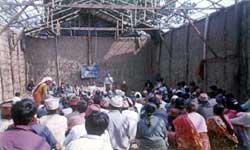 Shanti Ram Acharya has 12 dependants, all living at Khudunabari camp. Though all of them have been 'lucky' to make it to Category I (bonafide Bhutani), he is having second thoughts about applying for voluntary repatriation that begins on 15 February 2004.
Shanti Ram Acharya has 12 dependants, all living at Khudunabari camp. Though all of them have been 'lucky' to make it to Category I (bonafide Bhutani), he is having second thoughts about applying for voluntary repatriation that begins on 15 February 2004. "We wish we could go back, but there are a lot of uncertainties. Yes, we have been assured that we will be given citizenship immediately after repatriation, but what about land, houses and property that we lost?" he asks.
Acharya's dilemma is not uncommon. In the refugee camps of east Nepal, it is apparent that most Bhutanis are sceptical about the "major breakthrough" of the 15th round of ministerial talks in Thimpu last month. The leader of the Nepali delegation, Bhek Bahadur Thapa, said he had returned "a happy man", but his joy is not shared by most Bhutanis here who have waited over a decade to go
home.
Walking through narrow alleys between clusters of closely built thatch huts, there is a conspicuous lack of jubilation surrounding the news that the refugees are closer to repatriation. Such is the distrust of Thimpu's real motives, that almost everyone in the three 'home-going' categories (I, II and IV) are surprisingly non-committal about going back.
 "The Thimpu agreement isn't anything new," says Dr Til Bahadur Gurung, camp secretary at Khudunabari. "A timeframe has been set for the completion of repatriation, that's the only new element that I can see." Gurung's ancestral home is Chirang's Lali Kharka in Bhutan, but he has been placed in category II. This means that should he choose to go back, he will have to spend a minimum of two years in probation and must conform to lengthy processes to regain his citizenship of Bhutan. Among them, he will need to speak Dzongkha, the national language, and provide proof that he never maligned the king, country and the people. He is among 8,595 people from Khudunabari who fall under the second category. Even after the probation period, there is no written commitment or guarantee that homes and properties confiscated by the regime will be returned.
"The Thimpu agreement isn't anything new," says Dr Til Bahadur Gurung, camp secretary at Khudunabari. "A timeframe has been set for the completion of repatriation, that's the only new element that I can see." Gurung's ancestral home is Chirang's Lali Kharka in Bhutan, but he has been placed in category II. This means that should he choose to go back, he will have to spend a minimum of two years in probation and must conform to lengthy processes to regain his citizenship of Bhutan. Among them, he will need to speak Dzongkha, the national language, and provide proof that he never maligned the king, country and the people. He is among 8,595 people from Khudunabari who fall under the second category. Even after the probation period, there is no written commitment or guarantee that homes and properties confiscated by the regime will be returned. "The government of Bhutan is only interested in closing down the camps from eastern Nepal because it has become an international embarrassment to them," says Garima Adhikari, the convenor of Refugee Women Forum, and a category II refugee herself. She says the Planned Voluntary Repatriation has confused refugees more than ever. On one hand, they don't want to miss an opportunity that has taken 13 years in the coming, but on the other, they fear renewed persecution inside Bhutan.
"We haven't forgotten the atrocities that drove us here," says Daljeet Rai, a category I refugee who was forcefully evicted on purely religious grounds. "We cannot return blindly when we continue to hear that Christians are still persecuted. I was forced out because I was a Christian, and I will not renounce my faith," Daljeet says, showing us his old expulsion order.
The contradictory result of the Joint Verification Team (JVT) doesn't seem credible to the refugee interviewees at Khudunabari. Families have been divided into different categories, which if implemented in its present form, would lead to family members separated from each other. Ram Prasad Dahal, his wife Goma and son Ravin were put in the non-Bhutani category. But his other son Govinda and daughter Pramila have been placed in the category of those who 'voluntarily emigrated'. Kumar Khadka, who served in the Thimpu police for seven years, has been categorised as a 'terrorist/criminal' by the JVT. Taking a guilt by association policy, his children, Bibek, 9, and Bishaka, 11, have been tarred by the same brush. His wife, however, was put in category II. "I haven't done anything wrong, I will go back if others will," says a defiant Khadka.
 SB Subba, chairman of Bhutani Refugee Representatives Repatriation Committee (BRRRC) still holds on to hope. "Perhaps, there aren't too many choices available to us, but I hope it will succeed," he says. "The treatment meted out to this first batch of refugees will be a test for Bhutan, and will determine our future course."
SB Subba, chairman of Bhutani Refugee Representatives Repatriation Committee (BRRRC) still holds on to hope. "Perhaps, there aren't too many choices available to us, but I hope it will succeed," he says. "The treatment meted out to this first batch of refugees will be a test for Bhutan, and will determine our future course." Subba and other refugee leaders agree that the road home may become smoother if direct dialogue is opened between the Bhutani government and refugee representatives themselves, instead of with Nepali government officials in the JVT. "We don't mean the king must negotiate with us, he can send his representatives and things can be sorted out between the monarch and his subjects," says Hari Khanal, a Bhutani journalist and former editor of Sandesh.
Refugees are putting forward three conditions for planned repatriation: citizenship, international monitoring, preferably by the UNHCR, and compensation should the Bhutani government be unable to return confiscated property. Many doubt voluntary repatriation in its present form will be successful. Even UNHCR officials say they won't actively encourage refugees to sign up for repatriation until they have solid proof that conditions inside Bhutan are secure.
"And that can only be ascertained if we're allowed to monitor the process," a UNHCR official here told us. UNHCR also says the Nepali media has exaggerated reports attributed to UNHCR chief Rudd Lubbers at its executive committee meeting in Geneva last month that the camps would be phased out. But some activities like child care centres and distribution of food items with little calorific value were being scaled back.
A senior US diplomat who visited the camps this week also downplayed the Nepal Bhutan bilateral agreement on repatriation. The Thimpu deal, he said, was "laden with hollow assurances" and had hedged on issues like providing residence permits, access to health care, education and welfare facilities to future returnees.


